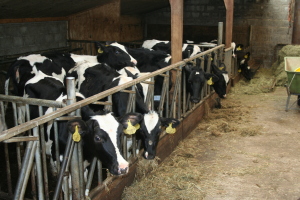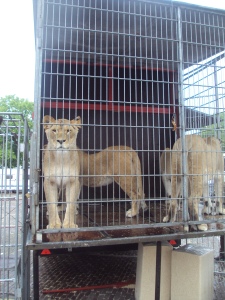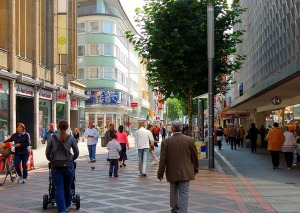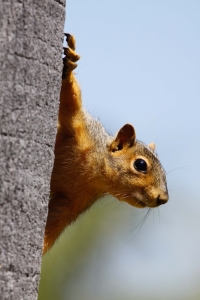Worldlog Semena 5 – 2015
Na semana passada o Parlamento discutiu a nosso pedido sobre bio-indústria. É incompreensível que o governo decidiu sobre o crescimento da pecuária, apesar dos efeitos adversos sobre o bem-estar animal, segurança alimentar, natureza e meio ambiente. Durante o debate, eu argumentei que a contração do gado holandês e aposta na regionalização são as únicas soluções para estes problemas. Tenho solicitei ao governo para investigar isto.
Holanda detém o maior número de animais por área no mundo. Os animais vivem amontoadas em estábulos sem luz do dia. Devido ao alto nível de estresse e baixa resistência eles ficam doentes. Os animais doentes e zoonoses (uma doença infecciosa que pode ser transmitida de animais para seres humanos) são um risco para a saúde pública. Além disso, 4.000 quilos de adubo por gado holandês produz anualmente um efeito muito negativo sobre a natureza eo meio ambiente.
Felizmente você vê na Holanda o crescer da resistência a indústria do gado megalomaníacos. Por exemplo, lançou esta semana a campanha WWF em conjunto com o banco holandês Rabobank e Friesland Campina (muito grande produtor de leite) uma campanha para que os agricultores trabalhem mais em harmonia com a natureza . Também os cidadãos se preocupam cada vez mais com as vacas no pasto e querem encontrar mais produtos locais e sazonais no supermercado. Podemos, portanto, concluir que a política esta atrasada …
Os animais não pertencem ao circo! Felizmente, a proibição de mamíferos selvagens no circo entra em vigor em setembro deste ano. Mas esta proibição não é suficiente em nossa opinião. A minha colega Esther Ouwehand apelou ao governo para estender a proibição a outros grandes mamíferos, répteis e aves, e também para refletir sobre o uso de mamíferos marinhos no aquário de golfinhos.
Boas notícias! O Ministro de Assuntos Economicos, em resposta a nossa moção disse que se envolverá com os varejistas para combater o desperdício de energia em larga escala através de portas de lojas abertas. Muitas lojas mesmo no inverno manten suas portas abertas durante o horário normal de expediente. Com isso muitos varejistas estão aquecendo a rua. Se optarem por sistemas onde as portas se fecham quando não há clientes e abrem para os clientes entrarem em sairem, eles podem economizar até 40% de energia. Isso é um grande lucro na carteira.
Mais notícias da Europa. Grã-Bretanha quer matar dezenas de milhares de esquilos cinzentos, financiados pelo dinheiro dos contribuintes europeus. “Uma caça cruel e inútil” diz nossa MEP Anja Hazekamp deste plano. Os proprietários que desejam se qualificar para o financiamento da UE, são obrigados a combater o animal sob novas regras. Anja pediu à Comissão Europeia em questões escritas para desaprovarem a subvenção na Grã-Bretanha. O objetivo do plano britânico é proteger a espécie nativa o esquilo vermelho contra o recém-chegado cinza. No entanto estudos mostram que tais campanhas matando têm pouco efeito sobre as populações de esquilo vermelho contra o cinza. Os esquilos vermelhos estão em sua maioria sofrendo a perda de habitat adequada pelo desmatamento, a poluição e as alterações climáticas. Lutando contra o esquilo cinzento não levará a lugar algum mas apenas ao sofrimento animal como resultado.
Na semana passada foi anunciado que em 2014 foi o ano mais quente do mundo. Para não quebrar o record novamente em 2015, teremos agora de tomar medidas impedir suportar as consequências.
Além disso, estamos ocupados com as eleições provinciais e placa de água que estão chegando. Próximas semanas vamos começar a nossa campanha em muitas províncias. Sobre as nossas prioridades e ações que eu vou lhe dizer mais em breve.
Até a próxima semana!
Last week, the Lower House debated on factory farming on our request. It is unbelievable that the government chooses for further growth of the livestock industry despite the harmful effects on animal welfare, food safety, nature and the environment. During the debate I argued that diminishing the number of Dutch cattle and that focus on regionalisation are the only solutions for these problems. I called the government to look into this.
The Netherlands keeps the largest number of farm animals per area unit in the world. The animals are stuffed together in stables without any daylight. They become ill as a result of the high stress and their low resistance. Ill animals and zoonoses (infections that can be transferred from animals to humans) pose a risk to public health. Also, the 4,000 kilos of manure generated by cattle farming per year per Dutch person has a very harmful effect on nature and the environment.
Fortunately, we see that the resistance against megalomaniac livestock farming in the Netherlands is rising. This week, for example, the World Wildlife Fund launched a campaign together with the Dutch bank the Rabobank and FrieslandCampina (huge dairy producer) to have farmers work more in harmony with nature. And the public is also increasingly indicating that they want to see cows in fields and would prefer to have regional and seasonal products in supermarkets. We can thus conclude that politics is hopelessly behind the times…
Animals don’t belong in circuses! Fortunately, the ban on wild mammals in circuses will take effect in September of this year. But as far as we are concerned that ban doesn’t go far enough. My colleague Esther Ouwehand called the government to broaden the ban with other big mammals, reptiles and birds and to reflect on the use of sea mammals in the dolfinarium.
Good news! Further to our motion, the Minister of Economic Affairs said that he will enter into discussions with shopkeepers about how to address the huge energy waste as a result of shops keeping their doors open. Many shops keep their doors open during opening hours all the time, even in winter time. Shopkeepers are keeping the streets warm as a result. If they choose systems which close the doors if there are no customers coming in or going out, they will be able to save at least 40% on energy. A profit for both their pocket and the environment.
And here is some news from Europe. Great Britain wants to kill tens of thousands of grey squirrels, financed by European tax money. Our Euro MP Anja Hazelkamp called the plan ‘a cruel and pointless hunt’. Land owners who wish to be eligible for EU subsidy would be required to fight the squirrels under new rules. Anja has requested the European Commission in written questions to reject Great Britain’s application for the subsidy. The goal of the British plan is to protect the native species, the red squirrel, against the grey newcomer. But researches have shown each time that such killing campaigns have hardly any effect on squirrel populations, neither on the grey nor on the red. Red squirrels mainly suffer from the loss of adequate habitat due to deforestation, pollution and climate change. The fight against grey squirrels will get us nowhere and only lead to animal suffering.
Last week, it was confirmed that 2014 was globally the warmest year on record. We have to take action now to fight the consequences of that and to prevent 2015 from breaking the record of 2014.
Additionally, we are working on the coming Provincial and Water Board elections. Next week we will start our campaign in many provinces. I will soon tell you more about our spearheads and actions.
Until next week!



